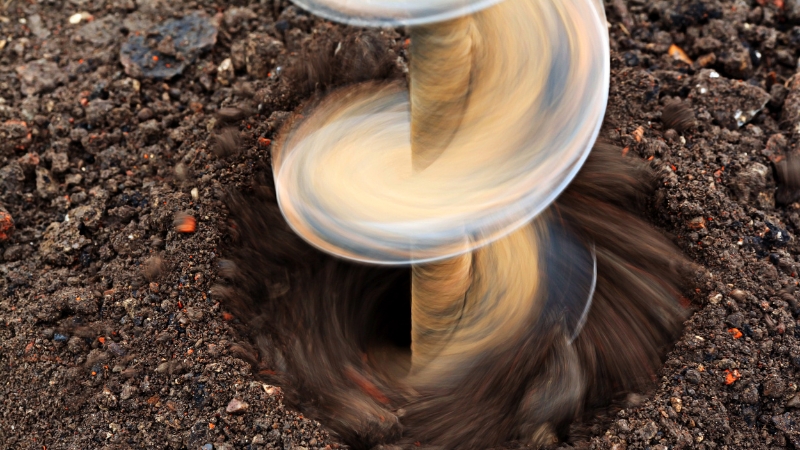

Soil testing for construction is a fundamental part of the construction process. It involves the thorough assessment and analysis of the make-up and characteristics of a proposed site. It is essential that soil tests are conducted by a skilled and experienced team of geotechnical professionals because the quality and composition of the soil can directly impact the integrity of the structure built upon it.
Soil testing generally sees the geotechnical team carry out a number of assessments including soil composition analysis, potential surface movement, compaction tests, moisture content analysis, shear strength tests, dispersive soils and permeability assessments, and more. The information garnered from these tests provides insights into the soil’s load-bearing capacity, density and reactivity, allowing engineers to design foundations that can adequately support the intended structure while identifying and providing solutions for minimising future risks.
Soil testing is a crucial step in the construction process as it helps to determine the capability, capacity, durability and safety of the proposed project. It helps engineers make informed decisions about the foundation design, the materials that should be used, and the appropriate construction methods that should be employed.
Soil testing is key to ensuring the future safety and functionality of the proposed structure, primarily because it reveals potential issues that may arise during or after construction like the settling, shifting or complete failure of the foundation.
Comprehensive soil testing also provides the engineering team with solutions for keeping the project on time and under budget. By identifying potential issues early on in the construction process, engineering and construction teams can make educated decisions about the design, materials and construction methods used.
Soil can be, and is, tested at various stages throughout the construction process. Initially, the soil is tested early during the planning and design stage. At this point, the geotechnical team collects a selection of soil samples from the proposed site to test for soil composition, potential surface movement (Ys), site classification (AS2870), moisture content and load-bearing capacity. The information obtained at this point of the project helps the design team prepare accordingly for foundation, earthworks and retaining structures.
Further soil testing is performed during earthworks to assist in preparing a suitable building platform, and again during foundation construction to help ensure that the actual conditions match the intended design parameters/specifications and to make any necessary adjustments in construction techniques or materials. Geotechnical engineers may also perform periodic tests on the excavated footings to verify bearing capacity prior to pouring concrete and address any unforeseen issues promptly. These comprehensive soil tests are essential in ensuring the safety, longevity, and overall success of construction projects.
Soil testing for construction is typically carried out by a geotechnical engineer with the support of a soil technician. The geotechnical team attends site and collects the appropriate soil samples needed for testing and either conducts those tests on-site or back at the laboratory.
A basic site investigation for anything up to a 2-storey residential site require a QBCC licensed site classifier to sign off on the report, whereas the larger scale or more complex investigations need engineering analysis and RPEQ sign off.
Our geotechnical team has extensive experience in soil testing for construction, and our service quality is backed by our RPEQ Engineer, NATA endorsement and our ISO9001:2015 accreditation. We have delivered solutions for a wide variety of clients across a range of different construction projects.
Soil tests can be carried out both on-site and in a specialised laboratory, depending on the scope of the project. The specific location and depth of the samples retrieved are determined based on the project’s proposed design and engineering requirements.
Various tests are conducted that help to identify the soil’s density, moisture content, bearing capacity and permeability.
Testing may include Particle Size Distribution Analysis/Sieve Analysis/Gradation Test + Hydrometer Analysis, Shrink Swell testing, California Bearing Ratio (CBR) testing, Soil Compaction testing using Nuclear Density Moisture Gauge (NDMG), and Standard Penetration testing (SPT). Of course, this is not an exhaustive list and with every project having its own unique challenges and requirements, there are a multitude of other tests available to geotechnical engineers.
At RMA Soils & Geotechnical, we provide a broad range of soil services and solutions for our commercial clients and their projects. We have extensive knowledge of ground conditions throughout South East Queensland and northern New South Wales, allowing us to effectively collaborate with our clients to provide cost effective advice, testing and reporting.
We are proud to be a NATA accredited laboratory, giving our clients the confidence that our recommendations are professional and reliable.
The importance of soil testing for construction lays in its ability to identify and forecast any potential issues that may arise as a result of building on a proposed site. By determining key insights into the soil’s composition and capability, engineers are able to make educated decisions about the design and build of the project which will help to mitigate future risks and ensure the long-term reliability of the project.
For more information on the projects we’ve been working on, head over and join our LinkedIn community and be sure to check out our projects page.